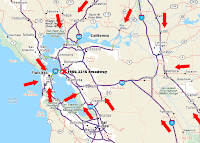What the heck is it like to be a PA? What's the down and dirty stuff you need to know in order to survive in this cut-throat world of being on the bottom rung? To answer these questions, I've decided to start a new series called "Real Stories from a Real PA," in which I'll post... (wait for it...) real stories from a real PA. And so, let's get started with our first production assistant. She's got tips and tricks on how to be an efficient productivity machine, she's brutally honest about what she really learned in film school, and I've put a lot of effort into placing some cute pictures around the article to illustrate her points. Let's dive in with the first tip:
 Tip #1: Streamline your work. For example, we had a large cut distribution list, and each person had to have their name and their number stamped on their DVD. To add to this we had an ancient DVD labeler that would jam and have temper tantrums all the time. I would ask the Assistant editor to get me a cut's TRT [Total Run Time] as soon as possible and while the cut was being output I would begin labeling DVDs and stamping them with each person’s number. This way when the cut was ready I had at all the DVDs ready to burn and usually already loaded into the DVD tower.
Tip #1: Streamline your work. For example, we had a large cut distribution list, and each person had to have their name and their number stamped on their DVD. To add to this we had an ancient DVD labeler that would jam and have temper tantrums all the time. I would ask the Assistant editor to get me a cut's TRT [Total Run Time] as soon as possible and while the cut was being output I would begin labeling DVDs and stamping them with each person’s number. This way when the cut was ready I had at all the DVDs ready to burn and usually already loaded into the DVD tower.
 Tip #1: Streamline your work. For example, we had a large cut distribution list, and each person had to have their name and their number stamped on their DVD. To add to this we had an ancient DVD labeler that would jam and have temper tantrums all the time. I would ask the Assistant editor to get me a cut's TRT [Total Run Time] as soon as possible and while the cut was being output I would begin labeling DVDs and stamping them with each person’s number. This way when the cut was ready I had at all the DVDs ready to burn and usually already loaded into the DVD tower.
Tip #1: Streamline your work. For example, we had a large cut distribution list, and each person had to have their name and their number stamped on their DVD. To add to this we had an ancient DVD labeler that would jam and have temper tantrums all the time. I would ask the Assistant editor to get me a cut's TRT [Total Run Time] as soon as possible and while the cut was being output I would begin labeling DVDs and stamping them with each person’s number. This way when the cut was ready I had at all the DVDs ready to burn and usually already loaded into the DVD tower.Tip #2: Try to line up your runs so you can do them in a big loop. This doesn’t always work out, of course, because sometimes there’s an emergency delivery. But whenever possible I would coordinate with the post coordinator as to what needed to go where that day and then set out after dailies to do everything in one giant loop of LA. That way I could be back for any afternoon cuts going out.
Tip #3: Check food orders before you leave the restaurant. This is important and it keeps you from having to run back and forth in traffic. [Note from CRC: Seriously, check your food orders. People WILL make you go back for the extra rice they ordered.]
Tip #4: Check traffic before you leave for anywhere and know some alternate routes in case you run into any jams. This really is learned from driving around LA but by the end of my PAing I usually knew 2 or 3 ways to get anywhere. This will help your sanity since there’s nothing worse than feeling stuck and claustrophobic in traffic.
Tip #5: Own up to your mistakes. Everyone makes mistakes. If you let people know early enough they can be fixed. If you try to pretend they never happened somewhere down the line it may come back to bite you and it'll be much worse than if you had let someone know when you made the mistake. For example, a tape may not be where it needs to be right before delivery and then everyone has to rush like a crazy person to fix it and that means you’ll probably be put out in traffic in the middle of rush hour.
Tip #6: Really everything I did as a PA, I did to try and keep me out of rush hour traffic. Because I hate traffic. I also strongly recommend audio books because then you don't feel so much like you are wasting away in a car all day.
Last notes: Film school taught me the fundamentals of film and media making as well as the basics of the software used, such as the Avid, Final Cut and Photoshop. Film School, at least the one I went to, didn’t teach us how to be a PA, it taught us we could be a writer, actor, director or DP. Then, when I got out to LA and realized there are literally hundreds of jobs and different skills that can be used to build a career in the film and television industry and being a PA is a great way to get your foot in the door of whatever department you hope to build your career in. Also, my school had it’s film and TV departments separate, which doesn’t make too much sense, since they use many of the same techniques and technologies these days. The main differences really lie in budget and time. I only point this out because I was a film student and have had great luck and success in TV and don’t really feel a pressing need to break into features. But anyway I guess I’ve learned to be patient and talk to people. Being a PA sucks but you meet people and those people were once where you are and they can help you and offer advice as to how you can get to where you want to go. And then, when opportunities do arise, take them and put in the extra effort to get all you can out of them, this may mean going in on weekends or staying after work to help someone or learn something on your own time while they happen to still be working. And also I guess just know that there is more to the entertainment industry than just directing, writing and acting, unless those are the things you really want to do.
Thank you, anonymous friend! Stay tuned for more Real Stories from real PAs!






No comments:
Post a Comment